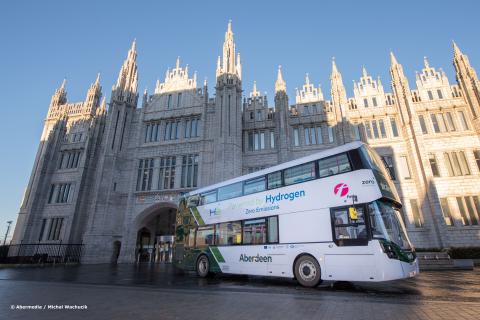The world’s first hydrogen fuel cell double-decker bus will enter service tomorrow in Aberdeen, Scotland.
First Bus – Scotland’s largest bus operator - will operate this zero-emission fleet in a project led by Aberdeen City Council. These innovative, clean buses show the city’s commitment to transition to green energy from oil and gas as part of its Net Zero vision.
The vehicles are part-funded by the European Union’s JIVE project, which aims to contribute to hydrogen buses’ commercialisation through joint procurement between cities. Cities following in Aberdeen’s footsteps include London and Birmingham, while Dundee and Brighton and Hove are lead partners in JIVE2.
Aberdeen City Council Co-Leader Councillor Jenny Laing said, “We are delighted to be launching the world’s first hydrogen double-decker bus fleet onto the streets of Aberdeen.”
“Aberdeen is one of Europe’s pioneering hydrogen cities and through the work of Aberdeen City Council, the city has developed a cluster of hydrogen activity, and the new double-decker buses are a great addition to one of the largest and most varied fleets of hydrogen vehicles in Europe. They have even more advanced technology which pushes established hydrogen boundaries and will greatly assist us in tackling air pollution in the city.”
Aberdeen City Council Co-Leader Councillor Douglas Lumsden stated, “It is fantastic to see the world’s first hydrogen-powered double-decker buses being driven about and used by residents of Aberdeen. The buses show our commitment to achieving net-zero and support the global energy transition as a climate positive city while cementing our position as a world leader in the energy sector as an economic driver for the city, region, Scotland and the UK.”
Andrew Jarvis, Managing Director at First Bus, said, “Today marks a significant milestone in our industry and the way that people choose to travel. Scotland will be home to COP26 later this year. It is fantastic to know that we will be setting a stellar example of just what can be achieved with new technology as we welcome leaders from around the world.”
“First Bus serves thousands of customers in Aberdeen, and we know that so many of our customers take the bus because they care about our planet and reducing their carbon footprint. We’re excited to now be able to offer them an even greener and quieter way of getting about the city”, he added.
Hydrogen will play a significant part in the bus industry’s future because they offer an extremely efficient fuel solution, with great range. The cutting-edge buses also take less than 10 minutes to refuel fully.
By saving one kilo of CO2 for every kilometre they travel, the new 60-seater double-decker buses will improve the city’s air. Besides, by being virtually silent in their journeys, they contribute to quieter streets.
The new £8.3million project has been funded by Aberdeen City Council, the Scottish Government, and the European Union's Fuel Cells and Hydrogen Joint Undertaking, with about £500,000 per vehicle.
The UK’s first hydrogen production and bus refuelling station were opened in Aberdeen in 2015 as part of a £19million green transport demonstration project. The Aberdeen City Council-led project tested the economic and environmental benefits of hydrogen transport technologies and aims to drive hydrogen technologies.
Source: Aberdeen City Council







